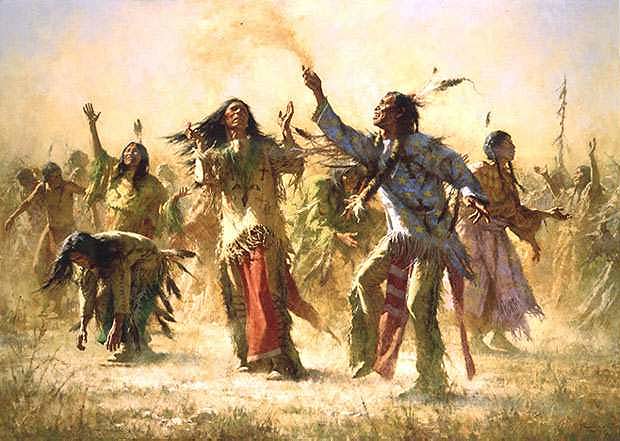
Rarely has the first meeting between white folks and Native people been as richly visualized as it is in Terrance Malick's The New World (2005), when, in the middle of a tall-grass field, an Englishman named Capt. John Smith meets the Powhatan princess Pocahontas. Not only did neither know either, neither had ever seen anything quite like either. As foreign as he was to her, she was to him. They each stand and stare in awe at a human being unlike anyone either has ever seen.
Those first meetings had to have been shocking. Black Elk claims he was ten when he saw his first Washichu. "At first I thought they all looked sick," he says, "and I was afraid they might just begin to fight us any time."
My guess is that love at first sight was impossibly unusual. Black Elk's fear may well be more standard fare.
Then again, some Native people didn't think much about fighting. Legend has it that War Eagle, Sioux City's Native patron saint, left his people when it became apparent that question of who would be chief was going to be determined by a fight. He walked away. War Eagle's statue stands high above the confluence of the Missouri and the Big Sioux because from the moment he met white people, he wasn't a war eagle at all.
A thousand immigrant diaries tell similar incredible stories about early meetings between Natives and white folks, neither of whom had a clue about the other. What those reminiscences describe seems utterly impossible today, but they happened and they happened often. Yanktons or Santees or Omahas simply invited themselves into the lives of pioneers, showing up uninvited, totally unaware of the value their new paleface neighbors put on private property, something totally sacred to the whites. Warriors would simply show up in silence and stare blankly through windows or walk right through doors and expect their white hosts to feed them.
Walking into other people's lives was a way of life. They didn't know to knock.
Thousands of such meetings are written up in pioneer memoirs: a man or a a woman, maybe an entire family looks up from a cup of coffee or pot of soup to see a painted face in the window, someone familiar maybe, but just as often, someone not.
That such moments didn't end in bloodshed seems impossible in our "Stand-your-ground" climate, but very, very few of those moments ever did.
Here's my favorite. In March of 1856, Mrs. E. H. Clark came here when her husband, who'd created a log home for his wife earlier, told his wife the neighborhood was, well, civilized enough for her to live. On the boat from St. Louis she'd lost her gold watch and chain, she says; but she'd brought along an entire set of china dishes. It wasn't as if she were bereft, after all.
Her father, a doctor, came a year later, and, she says proudly, was quite plainly upstanding: "He was the first Sunday school superintendent here," she says in her memoir, "and held that office continually until 1880." Educated, exemplary, and upright.
Her reminiscence of the early days is only a few pages long, but the most memorable incident she remembers is this one. Here's her telling:
At one time I had planned a dinner party and invited all my lady friends. I prepared the best meal possible for those days, with my china set all in place and was very proud to see it all spread, when just ready to invite my guests to the table, a big Indian appeared in the doorway and said, 'Hungry" in broken accents.
I said, "Yes, I get you some" and started to the stove, but he said, "No," and pointed to the table. I brought a generous helping in a plate but he walked out doors, gave a shrill yell which brought several others of his tribe and they all at once sat down, ate everything in sight, while the guests looked on in fear and trembling."And then, "Having finished," she says, "they left in great glee."
And that's it. End of story. End of memoir.
How the ladies composed themselves is not described. What they said once the gleeful Indians were gone isn't told.
Her entire memoir ends right there, at that moment--"they left in great glee," as if she'd just said everything that needed to be said about those early years. Multi-culturalism right there on the frontier.


















